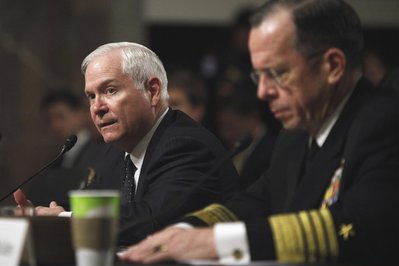Top military officials this week came out against “Don’t Ask, Don’t Tell” during a Senate committee hearing and unveiled their plan to change the policy.
Secretary of Defense Robert Gates and Chairman of the Joint Chiefs of Staff Adm. Mike Mullen both testified before the Senate Armed Services Committee Feb. 2 that the Pentagon was taking the initial steps to roll back the policy that has banned open gays from the military since 1993.
Pennsylvania Congressman Patrick Murphy (D-8th Dist.), who is spearheading the bill to repeal “Don’t Ask, Don’t Tell,” called the officials’ testimony “the beginning of the end” of the ban.
Gates testified that he “fully support[s]” President Obama’s position that “Don’t Ask, Don’t Tell” must be repealed and said “the question is not whether the military prepares to make this change, but how we best prepare for it.”
In his State of the Union address last week, Obama said he would work with Congress and the military to repeal the ban this year.
Mullen, who took a more personal angle in his testimony, called repealing “Don’t Ask, Don’t Tell” the “right thing to do.”
“No matter how I look at this issue, I cannot escape being troubled by the fact that we have in place a policy which forces young men and women to lie about who they are in order to defend their fellow citizens,” Mullen testified. “For me personally it comes down to integrity — theirs as individuals, and ours as an institution.”
Gates said the Pentagon will launch a one-year analysis of how best to change the law and, in the meantime, will implement a 45-day review of how the military can enforce “Don’t Ask, Don’t Tell” in a “more humane and fair manner.”
Pennsylvania Congressman Joe Sestak (D-7th Dist.), a cosponsor of Murphy’s bill, disagreed with Gates’ plan.
“It’s not time to study ‘Don’t Ask, Don’t Tell;’ it’s time to end it, and we should do so immediately,” Sestak said.
Aubrey Sarvis, executive director of Servicemembers Legal Defense Network, concurred that a full year is not needed to analyze the lifting of the law.
“We think a one-year study is far too long and unnecessary and this process must have finality,” Sarvis said, noting his agency would support “a reasonable implementation and transition period” if Murphy’s bill progressed through Congress this year.
Regardless of the plan, Human Rights Campaign president Joe Solmonese said the public support from Gates and Mullen signifies that the law is nearing extinction.
“When the Chairman of the Joint Chiefs of Staff and the Secretary of Defense, who served under President Bush, direct the military to mitigate the pace of discharges while moving toward implementation, we know that ‘Don’t Ask, Don’t Tell’ is on its way out,” Solmonese said.
During the hearing, however, Sen. John McCain (R-Ariz.) called Gates’ testimony “clearly biased” and noted Congress, not the Pentagon, will have the ultimate say on the law, which Gates acknowledged.
“We obviously recognize that this is up to Congress and my view is, frankly, it is critical that this matter be settled by a vote of Congress,” Gates said.
Murphy took over the Military Readiness Enhancement Act this past summer after former lead sponsor Ellen Tauscher (D-Calif.) left Congress. So far, the bill has 187 cosponsors, topping the previous cosponsor list by nearly 40 signatures. The legislation has yet to be introduced in the Senate.
After the hearing, Sestak urged his fellow lawmakers to “move quickly” on the bill and said that until it’s passed, Obama should take immediate action to halt discharges.
“If we are to study the process, our military and troops cannot be left in limbo,” Sestak said. “President Obama should sign an executive order — relying on the same ‘stop-loss’ authority used to extend tours of duty — to halt dismissals under this policy. In a time of war, we cannot lose any more troops that we depend on to keep our country safe.”
Jen Colletta can be reached at [email protected].

